How And Where To Create A Blog
Historically, if you wanted to know how to publish a book, you needed an agent to get a traditional publisher to look at your manuscript.
In fact, many publishing companies won't even open a manuscript if it doesn't come through an agent…
Which makes learning how to publish a book way more difficult.
Not to mention the fact that going through all that work to just land an agent isn't necessary if you want to publish a book.
What's worse is even if they do open it, it's still unlikely that your book will be published and sold in bookstores!
*Cue the groans and grumbles of irritation*
So is there a better method?
Yes! It's called self-publishing, and as a 6-time bestselling author who's broken down my system in our Become a Bestseller program, I'm here to go over how to publish a book.
Here's how to publish a book step-by-step:
- Decide Why You Want to Publish a Book
- Write Your Book
- Get Feedback Before Publishing Your Book
- Choose a Book Title
- Hire a Great Book Editor
- Design a Book Cover that Converts
- Create Your Kindle Direct Publishing Account
- Format and Upload your Book
- Self-Publish Your Book
- Price Your Book
- Form a Launch Team
- Maximize Book Launch Exposure
- Celebrate Publishing a Book!
In fact, there is another way for your book to not only be
What is Self-Publishing?
Self-publishing is the act of independently publishing your book on a platform like Amazon without the need of a traditional publishing house.

Personally speaking, I've self-published 6 bestselling non-fiction books on Amazon, sold tens of thousands of copies, and continue to collect thousands per month in royalty checks.
The success of my books has been directly responsible for the strong performance of my business, which has grown to over 7 figures in less than 2 years.
Self-publishing a book is done with these steps:
- Write a book you're proud of
- Decide which self-publishing platform to use
- Get your book edited, a cover designed, and it formatted
- Upload your manuscript and accompanying assets
- Hit "Publish" when you're read
- Your book is self-published!
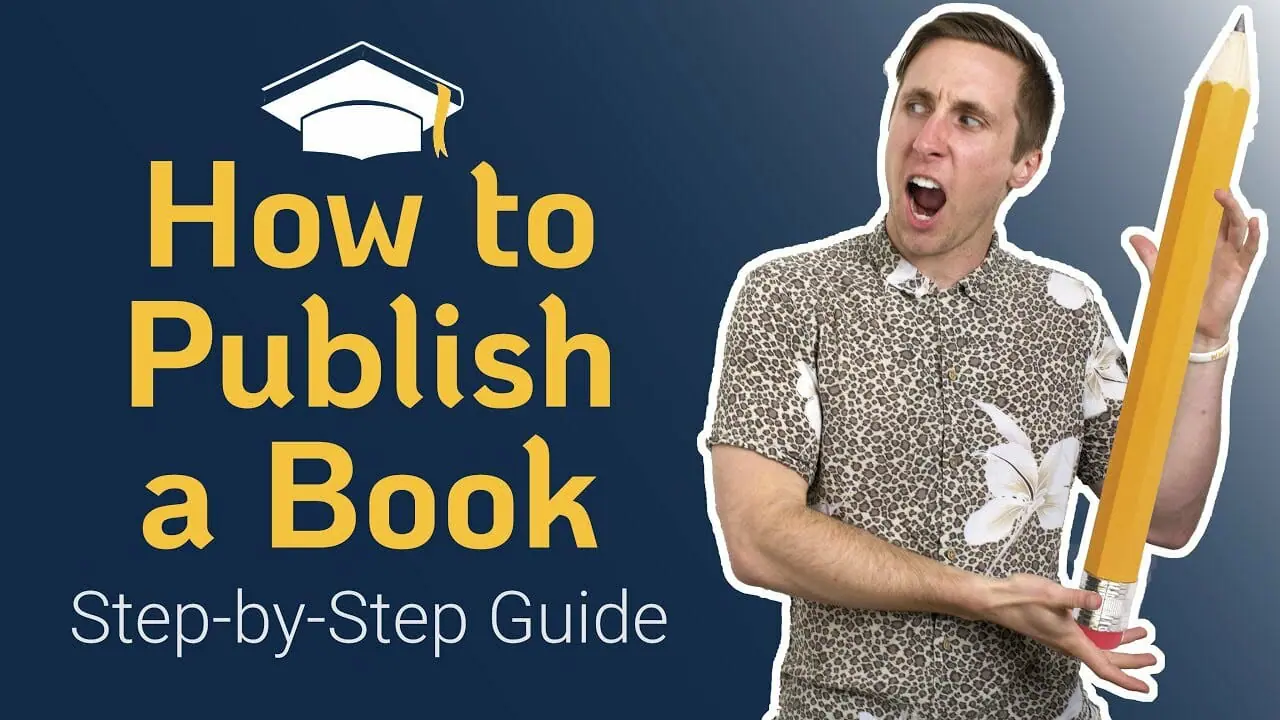
It's really that easy.
Five years ago, in order to achieve this level of publishing success, you would have needed to be extremely lucky to even land an agent who would attempt to find you a deal at one of the "Big 5" publishing houses.
This is no longer the case.
Not only do you no longer need one of the "Big 5" companies to publish your book, now self-published authors are actively turning down offers from publishing companies!
So If you are trying to publish your book and are having no luck landing a publisher, self-publishing could be the best option for you.
Better yet, making the decision to learn how to navigate the self-publishing world the right away can save you countless wasted hours.
Whether you want to do it yourself or work with one of the many self-publishing companies out there, we can help.
[Pssst! Want to see some of our students' published books? Check out the SPS library here! ]
What's the Difference Between Self-Publishing and Traditional Publishing?
It's easy to look at these two publishing routes and get confused. Why would someone self-publish a book when there are companies dedicated to doing it for you? There are actually many reasons.
What is the difference between self-publishing vs traditional publishing?
Self-publishing is a completely independent route with no barriers to entry whereas traditional publishing involves the acts of querying, landing an agent, and getting approved by a publishing house.

Check out the video above for more details on choosing self-publishing or traditional publishing.
| What You Get | Self-Publishing | Traditional Publishing |
|---|---|---|
| Sole control of your book's outcome | ✓ | X |
| Sole control of your book's rights | ✓ | X |
| Control over the story | ✓ | X |
| Control over the cover | ✓ | X |
| 100% of royalties | ✓ | X |
| Editing included | X | ✓ |
| Cover design | X | ✓ |
| Marketing | X | X |
| Deadlines | X | ✓ |
How Much Does it Cost to Publish a Book?
Pricing to publish a book varies greatly depending on its length, production costs, and the retail price you set.
That being said, it's important to be prepared when it comes to how much you'll actually pay to self-publish a book.
There are a number of factors that contribute to how much it costs to self-publish a book:
- The length of your book (this impacts printing costs)
- Getting your book edited
- The book cover design
- Any promotional ads/materials you want to utilize
- Another surprising, lesser-known cost I cover in the video below

How to Publish a Book in 2021
So many writers get overwhelmed with the abundance of information about the self-publishing process, what it'll cost, how to do it right, how to come up with a good book idea, and more.
I've created a step-by-step comprehensive self-publishing guide that will walk you through the beginning steps of how to write your book all the way to how to self-publish it on Amazon's Kindle (KDP) Network.
Let's get started soyou can get started!
#1 – Decide Why You Want to Learn How to Publish a Book
What you need to decide first when self-publishing a book, is WHY you want to write a book.
I encourage going through this brainstorming process as it's the only way to ensure that you're 100% committed to writing a book (and you're doing it for the right reasons).
This is a huge step that's largely responsible for our Become a Bestseller students to write and publish so quickly.
Here are some questions for you to decide why you want to publish a book:
- Are you an entrepreneur or freelancer with a new business trying to get a leg up on your competition by publishing a book?
- Are you a writer looking to boost your profile so you can land higher-paying writing jobs?
- Do you want to leverage your skills and knowledge to become a paid speaker or coach?
- Do you have a well-established business and you want to write a book to diversify your income streams and land speaking engagements?
- Or do you already have a successful story, and want to build an asset that will share the knowledge and skills you've gained over decades of experience?
- Do you have a larger number of book ideas or prompts you need to start writing?
Action Plan:
Come up with at least 10 valid reasons why you want to write a book. Use the questions above as a starting guide to brainstorm.
#2 – Write Your Book
If you've ever tried to start writing a book, you might have had moments where you've stared at a blank page for hours with nothing to show for it. Feeling frustrated, you resort to procrastinating and get nothing done!
This is normal, writing a book is hard work.
In fact, coming up with a book idea
Here's are some effective ways to write a book worth self-publishing:
- Buy a calendar. The best way to have your book complete is to have a calendar that schedules your goals per day/week.
- Create an outline. An outline is like a map of your book that provides direction to your story. It keeps you on track and ensures that your ideas are organized.
- Develop a writing habit. Condition yourself to write at the same time every day. With this practice, it will soon become a habit that will make writing a book automatic.
- Get an accountability partner. You can hold each other accountable to write and finish your by your "draft done" date.
- Build your writing environment. Yes, this can be a blanket for if you choose to use "build" literally or you can simply find an area where your head is clear, there are no distractions, and where you can write in peace.
To learn more tips on how to write faster , here's a tutorial video of the simple process I use to write over 1500 words per hour:

#3 – Get Feedback on Your Book Before Publishing
When writing your book, it's important to get as much feedback as early in the process as possible.
It's essential to get this feedback in order to improve your writing.
Everything from creative writing to factual, non-fiction works needs feedback in order to produce a polished publication.
As writers, it's all too easy to retreat into your cave for a long period of time, spend countless hours writing what you think is the perfect first draft, only to find that a) your draft doesn't make sense to anyone else or b) no one else is as interested in the topic as you originally thought.
Writing tips can come from anywhere and the best usually come from those reading your book for the first time.
Not only can a fresh set of eyes on your book help you catch typos and grammatical errors, but a new perspective can give you ideas for tightening up your story and making the theme more clear, like in
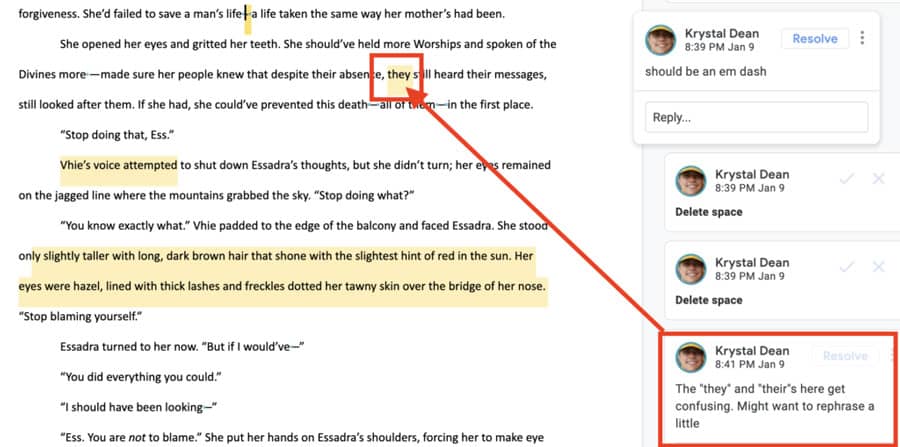
Giving your book to one (or more) "beta readers" before giving it to an editor and self-publishing can also cut down on the time and cost of paying a professional editor.
You can also use a piece of writing software like Grammarly or the Hemingway Editor so you can learn as you write!
Action Plan:
Reach out to a few friends who could provide good (preferably unbiased) feedback, and ask them if they'll be willing to read a chapter or two (or the whole book!) as you finish writing
#4 – Choose a Book Title
Contrary to popular belief, you should never decide on a book title until after you are done writing your first draft.

This is because choosing a book title first often results in you "writing yourself into a corner" because you're trying so hard to align your story to the title of the book instead of writing what needs to be written.
Don't make this more complicated than it needs to be.
The key to choosing a perfect title is: the simpler the title, the better.
As you're brainstorming ideas, always remember to keep it simple.
Your title should also be clear on what your readers will receive by reading your book. This is because experts state that a clear promise or a guarantee of results will further intrigue your readers.
It's certainly what's made our Become a Bestseller students so successful during their launches.
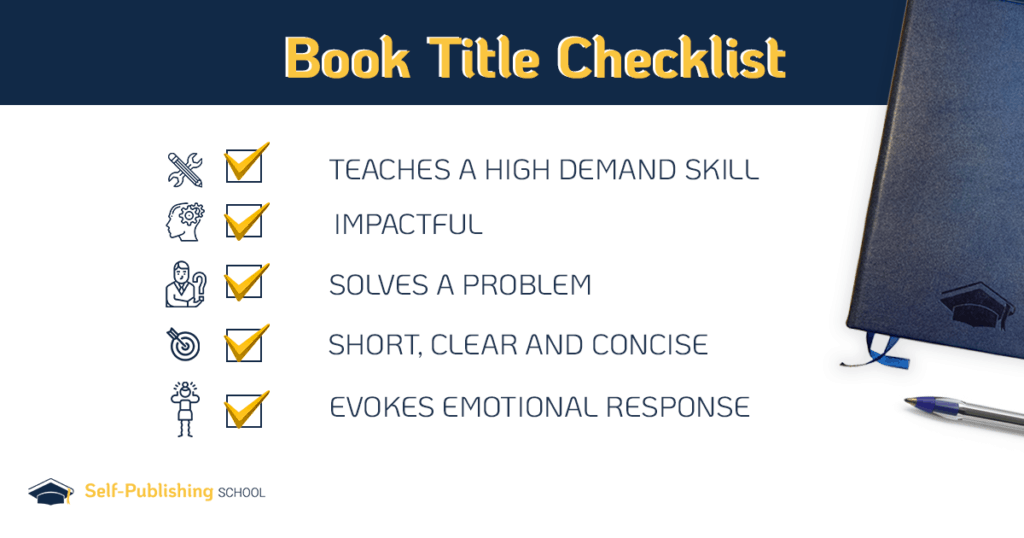
Here are some questions to consider when creating your memorable book title:
- Is your title going to teach a high demand skill?
- Can your title impact someone's life?
- Can your book solve a very difficult problem?
- Is it short enough to read in a thumbnail image on Amazon?
- Does it elicit an emotional response?
Action Plan:
Once you've narrowed down your book titles, send out an email to your friends and family or put a poll up to your audience asking what title they'd prefer. You could also ask a community of other authors what they think.
#5 – Hire a Great Book Editor
Hiring a great book editor can mean the difference between becoming a bestselling author, or self-publishing a mediocre book. Therefore, it's important to take as much time as necessary during this stage of the process.
To find an editor for your book, begin with your personal network.
Do you personally know any qualified editors?
Start there. If you don't, then do you know someone who knows an editor? If you don't have any luck finding an editor within your personal network, don't worry!
Depending on your budget, you can either hire a professional book editor or hire a more budget-friendly editor from Upwork. But be careful and always check references and portfolios of work.
As a Self-Publishing School student, we will also provide you with a Rolodex of approved and vetted book editors who all do a great job, as you can see in the example below.
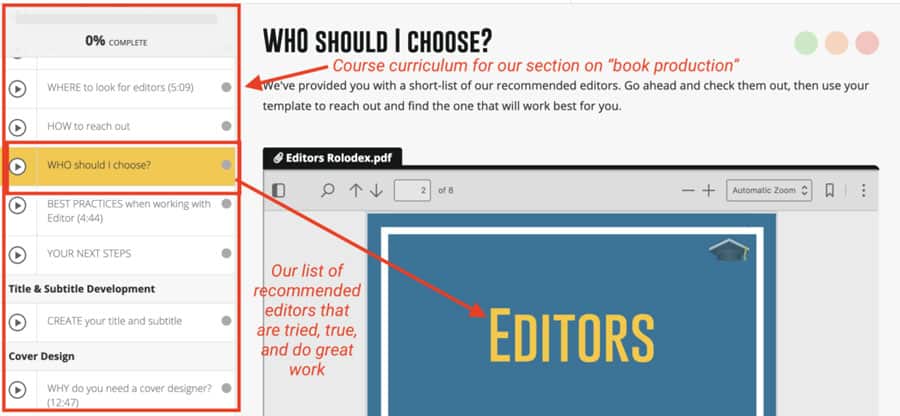
No matter how you find your editor, make sure you're a good fit before committing to the full book by paying them a small sum ($25 or so) to edit a few pages or a chapter of your book.
Make sure the editor is interested in the subject matter, that they can get your whole book edited in 3.5 weeks or less including back-and-forth revisions, and that their edits are both accurate and make sense to you.
If you don't feel you're a good fit following a sample edit, then let that $25 go and find an editor who's going to work out rather than sinking more money into a relationship that might be a mistake.
Whatever you do, don't give up during the editorial process! If one editor isn't working out for you or meeting your needs, find another.
Action Plan:
Find a friend or professional editor who can make sure your book is error-free, and start working with them sooner rather than later!
#6 – Design a Book Cover that Converts
When it comes to self-publishing, a high-quality book cover is one of the most important elements that will get your book to convert into sales!
The reason is
"Don't judge a book by its cover" simply doesn't apply to actual book covers, as much as we wish it did.
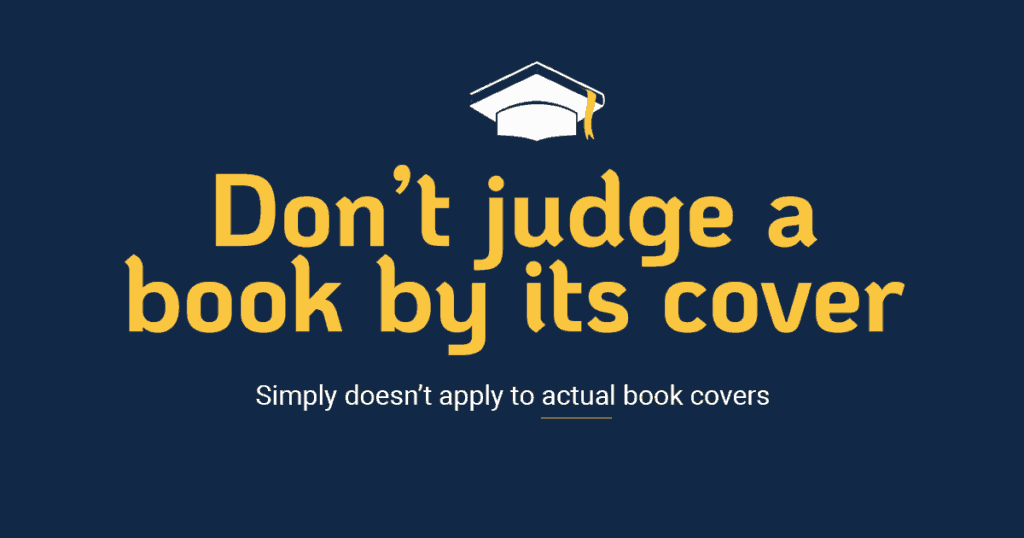
The hard truth is thateveryone judges a book by its cover whether they realize it or not.
So you must make sure that it is created professionally and that it will stand apart from the rest of the books in your genre or category.
What makes a good book cover?
- Simplistic styling. Too much going on will make readers unable to figure out what your book is about. Keep the cover minimalistic and it will convert more readers.
- Professionally designed. Book cover designers know how to create book covers that convert. They have industry knowledge and have studied what works and what doesn't.
- Clear title and subtitle. The title on your cover does matter. The easier it is to read, the better. This allows your readers to clearly see what your book is about as they scroll through Amazon or other book retailers.
- A design style that fits your intended audience. If you're writing a faith-based book intended for an audience of faith, having an overly dark, devilish cover doesn't make sense.
You can find amazing book cover designers on freelancing sites such as:
- Ebook Launch
- 99 Designs
- Happy Self Publishing
- 100 Covers
- Fiverr
- Upwork
Prices will vary depending on what type of service you want, but the end result will be well worth the spend.

Action Plan:
Find a book designer with any of these sites and your book will stand apart from the rest of its competition!
#7 – Create Your Kindle Direct Self-Publishing Account
Amazon has a self-publishing service called Kindle Direct Publishing where you can create and manage your Kindle eBook, paperback, and audiobooks.
It's the best way to learn how to publish a book and start selling quickly, and I've used it for all my self-published books.
I highly recommend it for all new self-publishers!
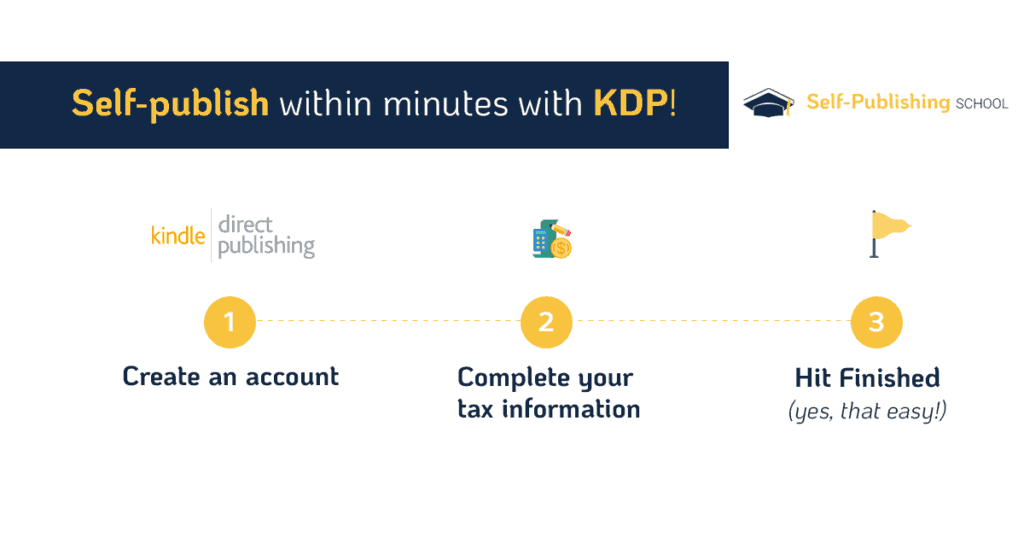
Amazon also acquired the well-known book printing company CreateSpace and they're now merged as one. This means you can now offer print books to your audience.
Here's how to set up your KDP account on Amazon:
- Visit https://kdp.amazon.com and create an account with either your existing Amazon account or your email address.
- Next, you must complete your tax information. You will not be able to submit your published book if you do not complete this step.
- Once your tax information is complete, hit "Finished" and your account is complete!
Action Plan:
Follow these steps to create your KDP account! With this platform, you can figure out how to publish your book within minutes and soon have it appear worldwide!
#8 – Format Your Self-Published Book
If you're on a budget, there are plenty of resources online that can tell you how to format your book yourself for free.
You can start by looking at Amazon Kindle Direct Publishing forums where there are plenty of discussions on book formatting.
You can also use KDP's free resources to help format your book. Formatting can be a frustrating experience for the uninitiated though, so if you have a few bucks to spare, you might consider paying someone to help you.
Typically, nonfiction books don't have an indent between paragraphs but instead, they have spaces whereas fiction books are indented with each new paragraph.
Below are formatting examples from Jenna Moreci's The Savior's Champion and my book, Published.
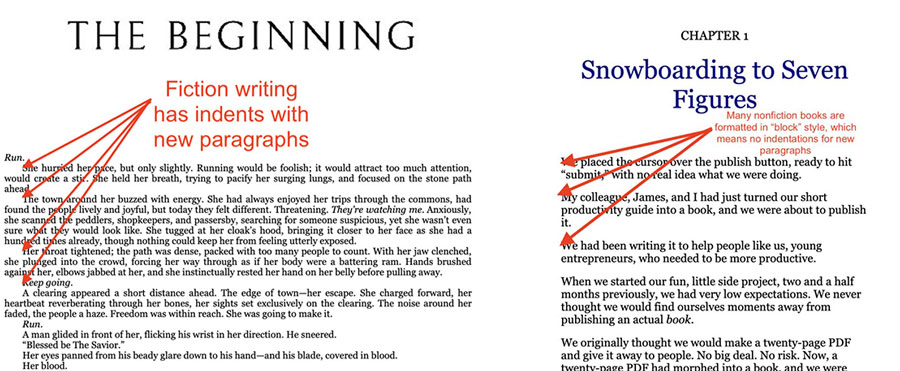
If you want to pay for formatting, Liber Writer is a low-cost, effective option for converting a Microsoft Word file to Amazon's Kindle format. If $60 is too much, you can also find people on Fiverr to format your book for Kindle.
Just be sure you hire someone who knows how to format your specific book genre.
Action Plan:
Make sure your book is formatted properly by using the free online resource above or hiring someone who can handle the formatting process for you.
#9 – Self-Publish Your Book

When you feel confident your book is ready for the public, you can create a KDP account and upload your book.
This is how to upload your book on KDP:
- On the KDP mainpage, locate and click on "Your Bookshelf".
- Locate and click on "Kindle eBook Actions".
- Then, locate and click on "Edit eBook Content".
- Finally, click on "Upload eBook Manuscript", and upload your manuscript file from your computer.
Amazon also allows you to select 7 keywords or keyword phrases to make sure your intended audience can find your book when searching on Amazon.
It's highly recommended you also select two different categories on Amazon your book might fit into so you can reach a broader audience.
To select keywords and categories, look at other best-selling books in your niche and notice what keywords and categories those authors chose.
Once Amazon finishes uploading your file, a confirmation message will be sent and you can preview the uploaded file to check for any errors. Create your Amazon author central account after uploading your book.
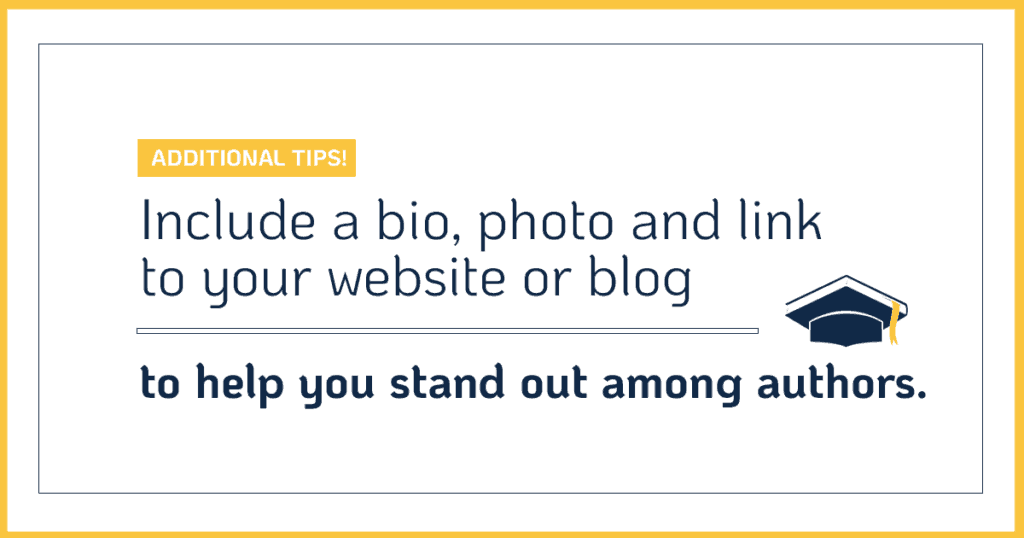
Include a bio, photo, and link to your website or blog to help you stand out among authors. After a few more steps, you'll be ready to publish your book, at which time you'll click "save & publish" in your KDP book dashboard.
Afterward, you should be ready to publish your book! Just click "save & publish" in the book editing screen!
#10 – Price Your Book
One of the most important decisions when it comes to self-publishing a book is how to price it. The most common question I get from new writers is, "How much should my book cost?"
To answer this, my general rule of thumb is to have your book priced is between $2.99 to $5.99. To be more specific, when beginning a launch, I would begin by pricing the book at $0.99 for the launch period.
Then I would set the price to 2.99, and I would moderately increase the price by $1 every week and measure how well the new price performs. Once you see a sales dip, that will determine the exact price of your book that will guarantee book sales.
Action Plan:
Find the perfect price by using this strategy that will attract your readers and best drive long-term success.
#11 – Form a Launch Team
Your launch team is the group of people who are dedicated to helping make your book successful.
They should be a passionate group of individuals who are eager to make your book launch successful. Remember, one highly skilled team member is better than a group of mediocre ones!
Here's a video detailing how to use a launch team effectively:
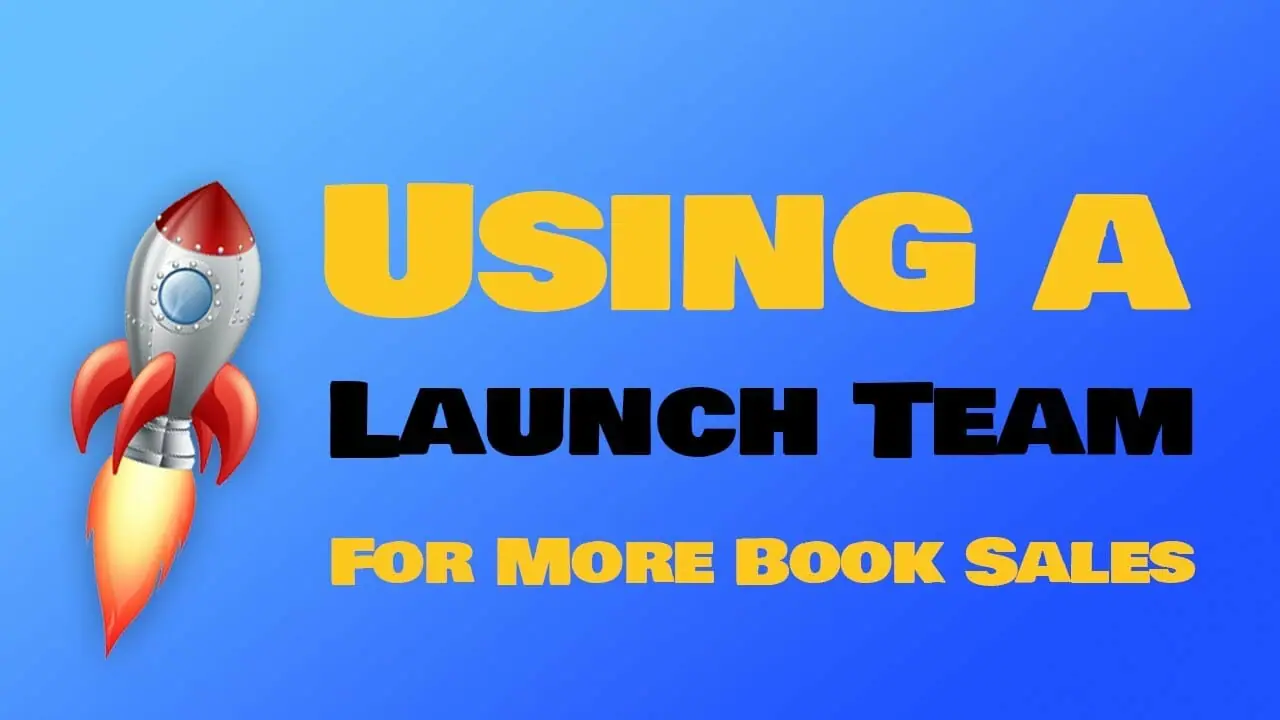
To find quality candidates, here's a questionnaire you can use to assess applicants and see if they're qualified to market your book:
- Why do you want to support my book?
- What goals are you trying to reach with this project?
- How would you market this book?
- Which influencers would you reach out to and why?
- Do you have a genuine interest in my book and its genre?
Action Plan:
Create an application with questions that align with your thought process. Try to be open-minded with those who think outside the box – they may be the perfect candidates that can get your book to become a bestseller.
#12 – Maximize Book Launch Exposure with Reviews
It's not enough to learn how to publish a book and be done with it. You still have to take action even after your official launch.
As soon as your book goes live on Amazon, be sure to leverage your launch team and your audience to help you market your book! It may be odd to ask your fans for help, but your fans are there to support your project and want to see you succeed.
You might be surprised how willing they'll be to help you if you just ask!
Here are some marketing initiatives you can assign your team and audience to do:
- Share content from your book as blog posts across social media
- Submit reviews on Amazon (ensuring they don't make the mistakes in the video below)
- Help build your book's website
- Reach out to influencers for a future guest post or podcast feature
- Share a book review on their YouTube channel
- Buy extra copies to gift their friends
The additional exposure generated from your launch team and audience will help push your book up Amazon's rankings, which will drive more sales! There are even websites that help you with rankings, such as Kindle Ranker. Make sure to have a look at that!

Action Plan:
Create your book marketing launch plan using these methods. Measure each of these methods to see which will best get your book in the hands of new readers and convert into sales.
#13 – Celebrate Learning How to Self-Publish a Book!
Publishing after writing a book is just the beginning. Depending on your goals for your book, self-publishing can get you more customers, free publicity, and establish you as an expert in your niche.
This can help you land speaking gigs and build a business within your area of expertise.
Your book sales can also help fund your lifestyle with passive income.
Dream big about what you want your book to do for you. When you have a vision for where you want your book to take you, it will be easier to take advantage of opportunities as they arise.
Getting clear on what you want will also help you to be more effective when expanding your network along on your journey.
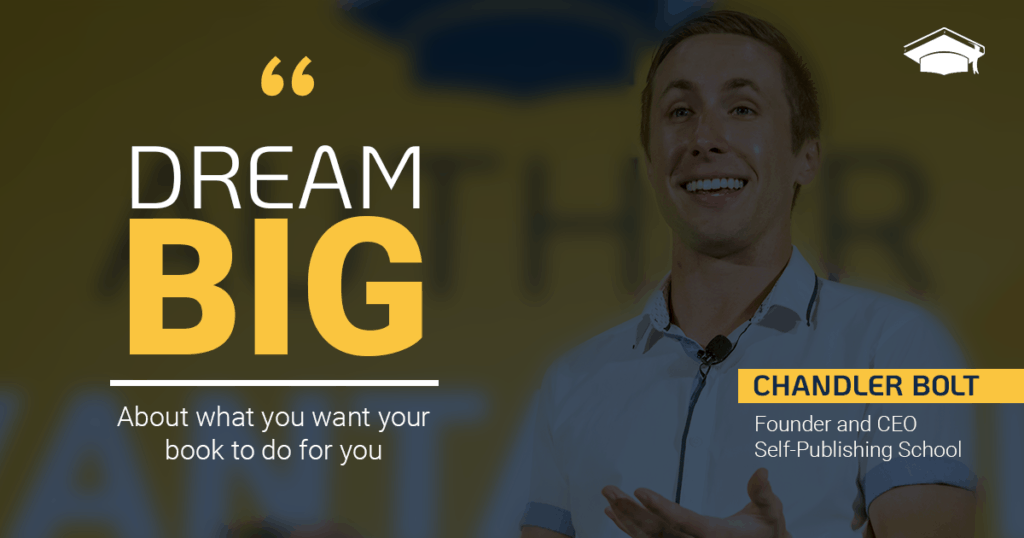
What to do Now
Now that you've learned how to publish a book, it's time to take action and bring yourself one step closer to your goals and dreams.
If self-publishing a bestseller is something you want to do, and you're serious about changing your life and your business for the better by getting your book out there in the world, then you need a step-by-step system to follow to take action.
Check out the free class below to get started!
Disclosure: Some of the links above may contain affiliate partnerships, meaning, at no additional cost to you, Self-Publishing School may earn a commission if you click through to make a purchase.
How And Where To Create A Blog
Source: https://self-publishingschool.com/how-to-publish-a-book/
Posted by: johnsonsefuldsider1981.blogspot.com

0 Response to "How And Where To Create A Blog"
Post a Comment